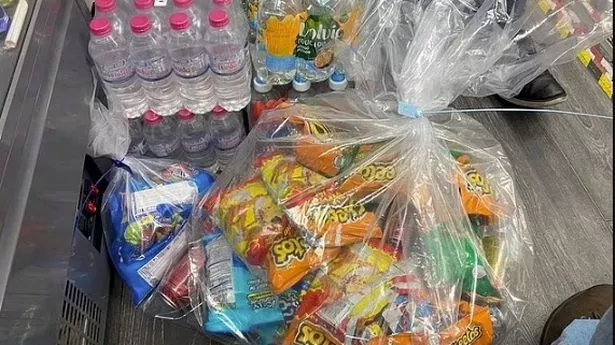Brits have been warned sweets, snacks and fizzy drinks on corner shop shelves could contain banned additives linked to behavioural problems and some cancers.
Chartered Trading Standards Institute (CTSI) found 4,000 potentially harmful items worth £8,500 in items across Staffordshire alone recently when it carried out an audit. It is now alerting British parents in the weeks before Christmas that American sweets often contain potentially hazardous or undeclared ingredients.
But demand for such confectionery and crisps has rocketed, the industry says, primarily due to videos celebrating the items frequently posted TikTok. Cheetos, Twizzlers and Jolly Ranchers, now common in shops in the UK, are among a host of products, for which the professional body CTSI has shown concern, it is believed.
Dean Cooke, CTSI lead officer for food, said: "Social media has amplified the demand for American sweets, with influencers on platforms like TikTok showcasing these colourful products in ways that appeal to children and teenagers. While this drives seasonal sales, it also creates a dangerous market for items that fail to meet UK safety standards."
The Mirror has contacted The Hershey Company, which makes Twizzlers, Jolly Ranchers, Lemonheads and other sweets believed to be identified. While CTSI does not implicitly name any brands, photographs appear to idenify several well-known products.
The CTSI investigation discovered widespread sale of crisps containing the additive "Yellow 6" - a synthetic food dye restricted in Britian. In the UK, products containing this substance, also called "sunset yellow" or "E110", must carry a disclaimer stating the products can cause hyperactivity in children.
Another concerning chemical found was the preservative EDTA, which is found in the US version of Mountain Dew, but is supposed to be banned entirely in fizzy drinks in the UK. Also called calcium disodium, studies of this compound have revealed links to fertility problems as well as the development of colon cancers.
Carrageenan, a thickener made from red seaweed, was also found in a number of jelly sweets. While carrageenan isn't banned in the UK it is forbidden from being added to jelly-like confectionary sold in Britain as it can represent a choking hazard to children due to its firm consistency.
Other banned substances found in sweets include mineral oils used to increase the shelf life of products that create a glossy, smooth coating. While considered safe in the US, studies suggest the petroleum derived additive could raise the risk of non-melanoma skin cancer and bladder cancer. Chemically bleached flour, which is banned in the UK due to links to cancer risk, was also found in some items.
The Christmas season is a period of high demand for these products with interest among British children driven by influencers posting videos of "candy hauls" and reviews of imported sweets on social media, CTSI said.
Trading standards officials are working to take such products off British shelves, the body added. However, Mr Cooke continued: "Parents need to be vigilant in checking labels to protect their children from potential harm."
Councillor Victoria Wilson, who is responsible for trading standards at Staffordshire County Council, where the recent audit was conducted, added: "During this pilot project, we were alarmed to find over 3,300 unsafe items on sale, many of which contained unauthorised ingredients and were targeted at children.'
"These items are often poorly labelled and can contain harmful additives, posing serious public health concerns. Parents need to stay alert and avoid products with unclear labelling, especially during the festive season."
The Mirror has approached The Hershey Company and Frito-Lay, which makes Cheetos, for comment.
